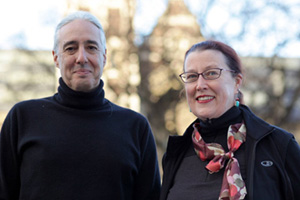Husband and Wife Team Trace the Roots of Youth Violence

Avshalom Caspi and Terrie Moffitt have just won the Klaus J. Jacobs Research Prize for their research research on mental health and human development.
APS Fellow Avshalom Caspi and APS Fellow Terrie Moffitt hold professorships at two institutions: Duke University in Durham, North Carolina, and King’s College London. The pair, who research mental health and human development have just won the Klaus J. Jacobs Research Prize, given to individuals from all disciplines who make outstanding scientific contributions to improvement of young people’s development and perspectives worldwide. The prize includes 1 million Swiss francs to further the couple’s research.
The Jacobs Foundation considers it vital to ensure that scientific findings from interdisciplinary research are incorporated in practice, giving out two awards annually — the Klaus J. Jacobs Research Prize, and the Klaus J. Jacobs Best Practice Award. With their groundbreaking study on the interaction between genetic disposition and environmental influences, Caspi and Moffitt have shown that possibilities for positive development always exist. Their research measures human growth and development from childhood through adulthood, showing that it is not just genes or environment that shape a person, but rather the interactions between the two.
Moffitt and Caspi’s work has led to programs to improve the social and living environment of children, especially in poor neighborhoods. “Their work has had an enormous impact with respect to the interaction of genetic risk and environment, and on the prediction of adult psychiatric outcomes from childhood behavior patterns,” said Dr. Judith L. Rapoport of the National Institute of Mental Health, in a Duke University press release. “This remarkable couple carries out their work in the United States, United Kingdom and New Zealand, where they are also training a new generation of investigators.”
The award ceremony for the Klaus J. Jacobs Research Prize and the Best Practice Award takes place at the University of Zürich on 3 December 2010.





APS regularly opens certain online articles for discussion on our website. Effective February 2021, you must be a logged-in APS member to post comments. By posting a comment, you agree to our Community Guidelines and the display of your profile information, including your name and affiliation. Any opinions, findings, conclusions, or recommendations present in article comments are those of the writers and do not necessarily reflect the views of APS or the article’s author. For more information, please see our Community Guidelines.
Please login with your APS account to comment.